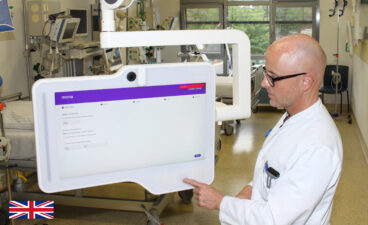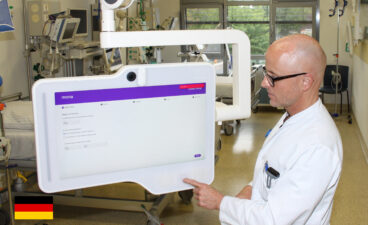New publication: Deep learning on Intensive Care Units to visually track medical consumables

High numbers of consumable medical materials (eg, sterile needles and swabs) are used during the daily routine of intensive care units (ICUs) worldwide. Although medical consumables largely contribute to total ICU hospital expenditure, many hospitals do not track the individual use of materials. Current tracking solutions meeting the specific requirements of the medical environment, like barcodes or radio frequency identification, require specialized material preparation and high infrastructure investment. This impedes the accurate prediction of consumption, leads to high storage maintenance costs caused by large inventories, and hinders scientific work due to inaccurate documentation. Thus, new cost-effective and contactless methods for object detection are urgently needed.
The goal of this work was to develop and evaluate a contactless visual recognition system for tracking medical consumable materials in ICUs using a deep learning approach on a distributed client-server architecture.
We developed Consumabot, a novel client-server optical recognition system for medical consumables, based on the convolutional neural network model MobileNet implemented in Tensorflow. The software was designed to run on single-board computer platforms as a detection unit. The system was trained to recognize 20 different materials in the ICU, while 100 sample
images of each consumable material were provided.
Using a convolutional neural network architecture, our approach consistently achieved good results in the classification of consumables and thus is a feasible way to recognize and register medical consumables directly to a hospital’s electronic health record. The system shows limitations when the materials are partially covered, therefore identifying characteristics of the consumables are not presented to the system. Further development of the assessment in different medical circumstances is needed. The technology will be embedded in future products of the company.
See the full publication free of charge here:
https://medinform.jmir.org/2019/4/e14806/
Peine A, Hallawa A, Schöffski O, Dartmann G, Fazlic LB, Schmeink A, Marx G, Martin L
A Deep Learning Approach for Managing Medical Consumable Materials in Intensive Care Units via Convolutional Neural Networks: Technical Proof-of-Concept Study
JMIR Med Inform 2019;7(4):e14806
DOI: 10.2196/14806
More stories

Using Clinical Data and AI to reshape COPD – fractional dynamics deep learning models

Clinomic receives a landmark order from Sana Kliniken for 200 digital assistance and telemedicine systems Mona
